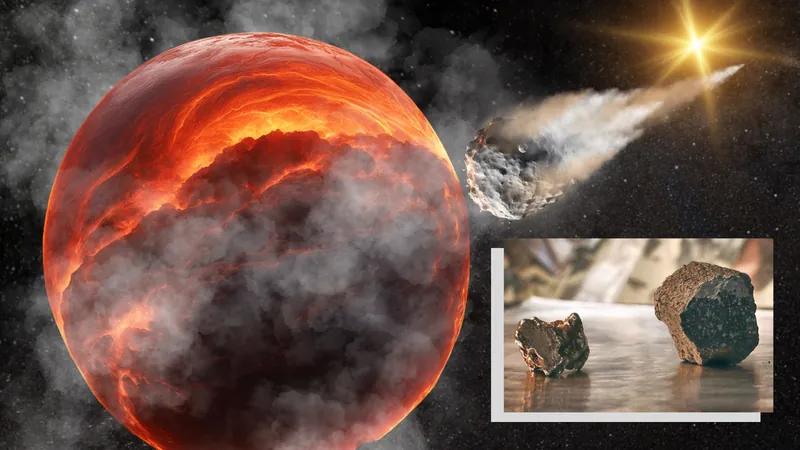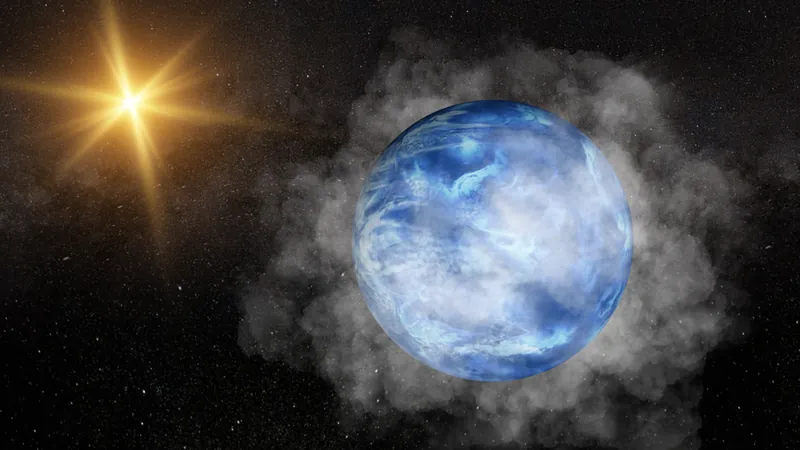
Asteroid Secrets: New Research Reveals Space Rocks Delivered Life's Building Blocks to Earth!
2024-10-11
Author: Jacques
Asteroid Secrets: New Research Reveals Space Rocks Delivered Life's Building Blocks to Earth!
Recent groundbreaking research has unveiled astonishing evidence that the essential ingredients for life on Earth were delivered from the cosmos via meteorites. This exciting discovery not only enhances our understanding of how life began on our planet but also provides invaluable insight into the quest for extraterrestrial life.
Dr. Rayssa Martins, leading a team of scientists from the University of Cambridge and Imperial College London, stated that these meteorites originated from what are known as "unmelted asteroids," a type of planetesimal. These small rocky bodies, believed to have formed around 4.6 billion years ago during the solar system's infancy, played a critical role in assembling the rocky planets like Earth.
The team’s analysis focused on zinc, a chemical element vital for life, found in meteorites. By tracing the origins of this element, researchers could better understand the "volatiles" present on early Earth—compounds that transition into gas at low temperatures and are essential for the development of life-supporting environments, particularly because they include water.
Dr. Martins explained, "One of the fundamental questions about the origin of life is understanding where the materials required for life's evolution originated. If we comprehend how these elements arrived on Earth, it could offer significant clues not just about our own origins but about how life might thrive elsewhere in the universe."
The findings revealed a fascinating distribution of zinc sources: about 50% of Earth's zinc came from the inner solar system, while the remaining half was delivered from beyond the orbit of Jupiter. The variation in these meteorites is largely due to their exposure to radiation from the young Sun. Early planetesimals melted and lost many volatiles, while those formed later retained more of these essential compounds.
Intriguingly, the study indicated that melted planetesimals contributed to roughly 70% of Earth's mass but provided only 10% of the necessary zinc. This suggests that a staggering 90% of Earth's zinc—and likely many other vital chemicals—was sourced from unmelted planetesimals known for their intact volatiles.
Furthermore, Dr. Martins emphasized the importance of understanding the composition of planets: "The distance from a star and its conditions are crucial for sustaining liquid water," she noted. "However, our research underscores that the materials available for developing planets vary remarkably, which could affect their potential to harbor water and life."
These pivotal findings hold significant implications for astrobiology and the ongoing search for habitable planets beyond our solar system. As Dr. Martins concluded, "Similar processes are likely occurring in young planetary systems across the galaxy, and recognizing the role of these materials will be crucial as we continue to explore worlds beyond our own."
As this research ignites new discussions in the scientific community, we stand on the brink of uncovering not just our own origins but also the possible existence of life across the universe. Could we be on the verge of discovering extraterrestrial neighbors? The search intensifies!









 Brasil (PT)
Brasil (PT)
 Canada (EN)
Canada (EN)
 Chile (ES)
Chile (ES)
 España (ES)
España (ES)
 France (FR)
France (FR)
 Hong Kong (EN)
Hong Kong (EN)
 Italia (IT)
Italia (IT)
 日本 (JA)
日本 (JA)
 Magyarország (HU)
Magyarország (HU)
 Norge (NO)
Norge (NO)
 Polska (PL)
Polska (PL)
 Schweiz (DE)
Schweiz (DE)
 Singapore (EN)
Singapore (EN)
 Sverige (SV)
Sverige (SV)
 Suomi (FI)
Suomi (FI)
 Türkiye (TR)
Türkiye (TR)